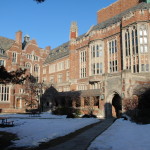As members of the Coordinating Committee, the elected leadership of GESO, we write to our colleagues who drafted “An Open Letter to GESO Leadership,” published on January 25, 2016. As a leadership group made up overwhelmingly of women, people of color and LGBTQ people, we face many of the challenges outlined in your letter. We struggle to balance the many hours of work we dedicate to make our university a more just and equal place and to gain a formal voice for our union, with our many academic and personal commitments. Many of us do this work as we push through the struggles we face personally to claim a space at Yale.
We appreciate your recognition “of the powerful work this union has done over the last two decades to support marginalized university employees and New Haven residents.” We are proud of our work to make Yale a more equitable place through years of struggle over graduate student and faculty diversity, support for graduate families and international scholars, Yale’s role as a neighbor and employer in New Haven, and the impact of Yale’s investment policies. As you know, we are also currently engaged in ongoing fights to address inadequacies in funding and mental health care, issues that disproportionately affect underrepresented graduate students, who are likelier to occupy positions of precarity at Yale.
Recognizing the seriousness and urgency of the concerns raised in your letter, in the coming days we will grapple with how to most fully respond. We deeply hope that we can build from our shared desire for a union to work together for a stronger and more equitable union and university.
We are committed to building a democratic organization that supports and encourages the leadership and membership of graduate employees from all backgrounds. We have developed our campaigns through thousands of conversations with our colleagues across campus; these campaigns continue to evolve through ongoing dialogue. Our union is not perfect and our members have a wide variety of opinions, in particular about how we organize. All of us have made mistakes as we learn how to organize—we are not professional labor organizers, but academics who believe that a union is an essential step on the path to a more just and equitable university. However, a union is only worth having if it truly represents the consensus of its members. As we continue to try to build that consensus, we invite those who share our vision that another Yale is possible to talk with us about how to improve our organizational practices, and how to build a union that more effectively resists reproducing Yale’s entrenched power structures.
Specifically, in response to your three asks “that union leadership immediately devote time to rethinking its organizing practices in order to reduce harm and oppression within GESO, and that it present a plan to its members in the coming months,” and that GESO “hire an external adviser to suggest, supervise, and oversee changes,” we are committed to taking the following steps:
1) We will reestablish the GESO Equal Rights and Access Standing Committee, co-chaired by Charles Decker and LiLi Johnson, to lead us and all interested members in conversations about organizing tactics in the context of campaigning. This committee will convene a forum open to all interested graduate employees in the coming weeks.
2) We will reach out to Race Forward: The Center for Racial Justice Innovation and other external organizations regarding possibilities for providing training and guidance.
3) We will release a statement before spring break with a summary of our progress and next steps.
Abbey Agresta, History
Alyssa Battistoni, Political Science
Ana Berdinskikh, Slavic Languages & Literatures
Ally Brantley, History
Andrew Brown, English
Robin Canavan, Geology & Geophysics
Rabib Chaudhury, School of Engineering
Charles Decker, Political Science
Lena Eckert-Erdheim, History
Andrew Epstein, History
Chris Forney, History
Morgan Galloway, Political Science
Pratima Gopalakrishnan, Religious Studies
Kelly Goodman, History
Aaron Greenberg, Political Science
Leana Hirschfeld-Kroen, Comparative Literature
Judith Hoeller, Physics
Lucia Hulsether, Religious Studies
Sarah Ifft Decker, History
LiLi Johnson, American Studies
Jeremie Koenig, Computer Science
Yahel Matalon, Comparative Literature
Chris McGowan, English
Lukas Moe, English
Jennifer Peper, Chemistry
Josh Phillips, Linguistics
Hari Ramesh, Political Science
Stephanie Ranks, English
Nado Rasolondrainy, Anthropology
Emily Sessions, Art History
Tif Shen, Math
Joshua Stanley, English
Emily Stewart, Geology & Geophysics
James Super, Geology & Geophysics
Shawn Ta, East Asian Languages and Literatures
Randa Tawil, American Studies
Jaylissa Torres, Chemistry
Gabriel Winant, History
Lindsay Zafir, History


